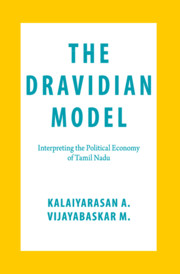Book contents
- Frontmatter
- Dedication
- Contents
- List of Tables
- List of Figures
- List of Abbreviations
- Acknowledgements
- 1 The Dravidian Model: An Introduction
- 2 Conceptualising Power in Caste Society
- 3 Democratising Education
- 4 Democratising Care
- 5 Broadening Growth and Democratising Capital
- 6 Transforming Rural Relations
- 7 Popular Interventions and Urban Labour
- 8 Fissures, Limits and Possible Futures
- Bibliography
- Index
8 - Fissures, Limits and Possible Futures
Published online by Cambridge University Press: 08 July 2021
- Frontmatter
- Dedication
- Contents
- List of Tables
- List of Figures
- List of Abbreviations
- Acknowledgements
- 1 The Dravidian Model: An Introduction
- 2 Conceptualising Power in Caste Society
- 3 Democratising Education
- 4 Democratising Care
- 5 Broadening Growth and Democratising Capital
- 6 Transforming Rural Relations
- 7 Popular Interventions and Urban Labour
- 8 Fissures, Limits and Possible Futures
- Bibliography
- Index
Summary
Chantal Mouffe makes a strong case for ‘Left populist’ mobilisation in building radical democracy. By Left populism, she refers to a populist mobilisation based on an expansive construction of a ‘people’ that works towards deepening equality and social justice for multiple marginalised groups. Taking cues from Laclau's works on populist reason (2005, 2006; Laclau and Mouffe 2014), she argues that radical politics requires deepening the idea of democracy so that ideas of freedom and equality are no longer confined to the domain of the liberal. They ought to be reworked so as to transform social relations towards realising substantive freedom and equality. Our narrative of the developmental trajectory of Tamil Nadu suggests that populist mobilisation around a non-essentialised Dravidian-Tamil identity and a demand for ‘social justice’ has indeed worked to expand freedom and reduce inequities across castes. Operating within a constitutional democratic framework, the state's experience highlights the democratic possibilities that can be opened up within such a structure. This is particularly important in postcolonial societies where mobilisations have often drawn upon essentialised and exclusionary constructions of ‘people’ that tend to undermine prospects for democratising social relations. The state's political experience suggests that it is indeed possible to institutionalise an inclusive populist mobilisation leading to a comparatively egalitarian developmental trajectory in the Global South.
There are thus two distinct contributions that our analysis of the state's development makes to the literature on subnational development and politics in the Global South. First, we establish that an inclusive populist mobilisation can generate sustained developmental outcomes for the marginalised social groups even when national-level interventions have an elite bias. Populist mobilisation and institutionalisation of that populist logic in the state apparatus have fostered better developmental outcomes in Tamil Nadu than in most states in the country. Such outcomes have been embedded in a growth process that has managed to structurally transform the state's economy and livelihoods. In fact, such outcomes have fed into the broad-basing of opportunities for entry into expanding modern productive sectors. Second, we have also demonstrated how an emphasis on status-based inequality has shaped this process. We thus call for greater attention to this source of inequality in the Global South.
In contrast to other political mobilisations that focused merely on classbased inequality, the Dravidian movement conceptualised injustice emanating from caste hierarchies to be more central in India. Piketty's recent work (2020) only affirms such a conception.
- Type
- Chapter
- Information
- The Dravidian ModelInterpreting the Political Economy of Tamil Nadu, pp. 210 - 230Publisher: Cambridge University PressPrint publication year: 2021



